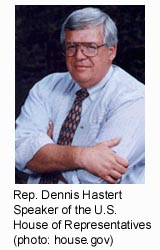|
Taxes top tech agenda
|
 |
April 2, 2001: 2:19 p.m. ET
Congressional leaders will focus on taxation, access issues
By Staff Writer Richard Richtmyer
|
CHICAGO (CNNfn) - Tax issues will dominate the technology policy agenda in Washington this year, Congressional leaders said Monday. And at the top of the list is President George W. Bush's proposed $1.6 trillion tax cut plan.
"It is something that will help the economy," Rep. Dennis Hastert, Speaker of the U.S. House of Representatives, told technology industry participants gathered for the Comdex trade show here.
"And if it helps the economy, it helps your business," Hastert said.
Hastert, a Republican from Illinois, was one of several federal lawmakers participating in a public-policy forum at Comdex. During a keynote presentation, he outlined the key technology issues Congress will be considering in the current session.
 Internet privacy, open-access to broadband Internet connections, and improved technology education and training also were on the list. But lower taxes and a "hands-off" approach to spurring the Internet economy were the predominant themes. Internet privacy, open-access to broadband Internet connections, and improved technology education and training also were on the list. But lower taxes and a "hands-off" approach to spurring the Internet economy were the predominant themes.
"I know that the news of dismal economic forecasts and the layoffs in the technology sector has some people in the industry worried," Hastert said.
"We've seen the ebbs and flows of the economy, and we've also seen the ups and down on the Nasdaq," he added. "But I think things are starting to stabilize. At least I hope they're starting to stabilize. And this is what we need to have in order to restore faith in the economy."
Last month, the House passed the centerpiece of Bush's tax cut proposal, a reduction in federal income taxes that would amount to $958 billion. In addition to the income tax cuts, Hastert said, it is important that the current moratorium on discretionary Internet taxes be extended.
The current moratorium, originally enacted three years ago, expires in October.
"By keeping the Internet free of discriminatory taxes, we've encouraged companies and consumers to do their business in the electronic marketplace," Hastert said. "Congress originally enacted the moratorium to prevent thousands of state and local taxing jurisdictions from using the Internet as a cash cow. Rather than slow down the Internet with a slew of new taxes, we ought to extend the moratorium to allow the Web to reach its full potential."
Other tax issues that Congressional leaders will be pursuing with respect to technology include making permanent a currently temporary tax credit for research and development expenses, tax credits for employers who provide their employees with technology education and training; the elimination of the federal telephone excise tax; and the elimination of taxes on computers and Internet access that companies provide free to their employees.
"The tax code can be used to eliminate the toll booths on the information superhighway," said Rep. Jerry Weller, an Illinois Republican and member of the House Ways and Means Committee.
Representing the Democrats, currently the minority party, was Bobby Rush, a member of the House Democratic leadership team. As a member of the House Commerce Committee, Rush said his top priority in the area of technology is to bring access to technology and the Internet to poor areas.
"We have to deal with the issue of the two-tiered economy," he said.
Rush, who represents the Chicago area, also said he will be pushing for a simplification of state and local sales and use taxes in connection with policy initiatives related to Internet and e-commerce taxes. 
|
|
|
|
|
 |

|

